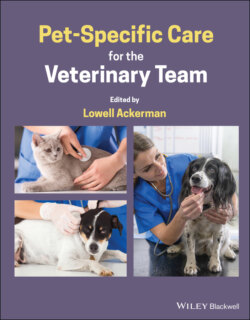Читать книгу Pet-Specific Care for the Veterinary Team - Группа авторов - Страница 20
1.1.3.1 Why Pet‐Specific Care Rather than Pet‐Specific Medicine?
ОглавлениеWhile the goal of pet‐specific care is better health outcomes, and there are many medical aspects to healthspan, it is also true that some of the most important aspects of success with pet‐specific care involve owner engagement in health management rather than disease management. Pet owners need to play an active role in keeping their pets healthy, not just bringing those pets in for veterinary care when something goes wrong.
The nomenclature is not yet fixed, but pet‐specific care suggests that there are many important aspects to care that are not necessarily medical in nature. A commitment by pet owners to feed a nutritious and balanced diet, to promote appropriate behaviors, to ensure their pet remains within a normal body condition score, and to provide regular at‐home oral care are all very important health factors. So is ensuring pets have regular exercise, socialization, and access to enrichment in their environments. Some may even say that promoting behavioral health is one of the best ways of ensuring medical health, since behavioral issues are more likely to result in relinquishment than medical problems (see 6.9 Preventing Behavior Problems).
Pet owners need to consider home issues such as fencing and shelter, pet‐proofing their home to avoid mishaps, making plans for someone to care for their pets when they are away, as well as making financial decisions for how to care for their pet in sickness and in health. They also need to do more than just go to the veterinarian and buy recommended products. Compliance and adherence are critical factors, and owners need to be prepared to follow veterinary recommendations at home, when they are not under direct medical supervision (see 9.17 Improving Compliance and Adherence with Pet‐Specific Care). For all these reasons and many more, the term pet‐specific care is preferred (at least currently) over the variety of other synonyms that are being used.
Veterinary healthcare teams definitely facilitate pet‐specific care, but owners must be engaged in the process and willingly accept their healthcare guardian role and take the responsibility seriously.
While all pet owners should aspire to pet‐specific care, it is reasonable to predict that not all will embrace the topic initially, as well as be prepared to pay for it. Early adopters are likely to be owners of new pets, and the market segment known as pet parents. These are the early adopters, but when success is achieved with these individuals, it is possible to leverage that success across the entire hospital population. However, even a small contingent of proponents can have a powerful impact on pets and the teams that care for them. According to Pareto's principle, if 20% of clients embrace pet‐specific care, they can contribute to 80% of positive outcomes (see 10.2 The Importance of Practice Differentiation).
